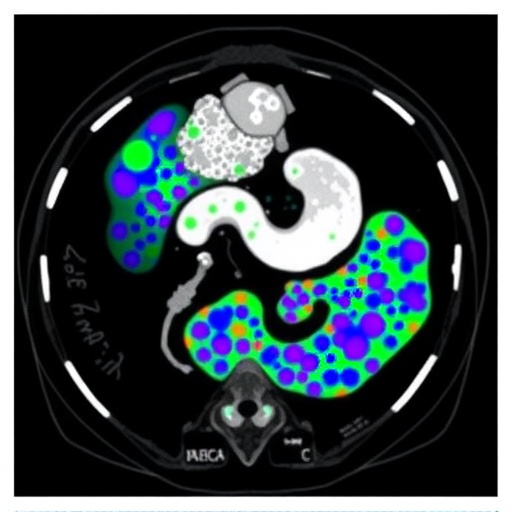In a groundbreaking development poised to reshape the diagnostic landscape of gastric cancer, scientists have demonstrated the potential of advanced imaging biomarkers to reliably predict microsatellite instability (MSI) status—an important molecular characteristic influencing treatment response. This pioneering study delves deep into the utility of metabolic parameters obtained from ^18F-fluorodeoxyglucose positron emission tomography/computed tomography (^18F-FDG PET/CT), marking a significant leap towards non-invasive, precision-guided oncology.
Gastric cancer, a formidable global health challenge, manifests heterogeneously at molecular and histological levels. Among its genetic hallmarks, MSI status has emerged as a crucial predictor for patient prognosis and responsiveness to immunotherapy. Traditionally, MSI assessment relies on biopsy tissue analysis using immunohistochemical assays or molecular testing, approaches that carry intrinsic limitations including invasiveness and sampling bias. This study addresses these gaps by exploring a sophisticated imaging-based surrogate capable of reflecting MSI status preoperatively.
The research team analyzed a cohort of 62 patients diagnosed with gastric cancer, all of whom underwent ^18F-FDG PET/CT scans prior to surgical intervention. This retrospective evaluation harnessed quantitative metabolic parameters derived from the primary gastric lesions, including maximum standardized uptake value (SUVmax), peak SUV (SUVpeak), mean SUV (SUVmean), metabolic tumor volume (MTV), and total lesion glycolysis (TLG). By focusing on these metrics, investigators sought to discern patterns that correlate with MSI positivity.
Among the metabolic variables scrutinized, MTV measured at different thresholds (30%, 40%, 50%, and 60%) alongside TLG at 40% threshold revealed statistically significant differences between MSI and microsatellite stable (MSS) patient groups. Notably, MTV at the 40% threshold (MTV_40%) exhibited the most robust discriminative power, achieving an area under the receiver operating characteristic curve (AUC) of 0.825. Such metrics underscore the parameter’s impressive diagnostic accuracy to differentiate MSI status non-invasively.
The study went beyond mere correlation by identifying a specific cutoff value of 44.1 for MTV_40%, which optimally balanced test sensitivity and specificity. Performance statistics were compelling: sensitivity reached 66.7%, specificity soared to 97.6%, and the overall accuracy stood at an impressive 85.5%. These figures highlight the potential for clinical utility, particularly in directing therapeutic decisions that hinge on MSI classification.
Crucially, multivariate logistic regression analysis reaffirmed MTV_40% as an independent and significant predictive factor for MSI status. This analytic rigor strengthens the validity of findings, positioning MTV_40% as a promising biomarker within preoperative workflows. The minimally invasive nature of PET/CT imaging, combined with quantitative rigor, offers a compelling alternative to conventional tissue-based diagnostic modalities.
Mechanistically, the elevated metabolic activity captured by ^18F-FDG PET/CT reflects underlying tumor biology differences between MSI and MSS gastric cancers. MSI tumors typically harbor a higher mutational burden and demonstrate distinct tumor microenvironment characteristics, which may influence glucose uptake patterns and volumetric metabolic burden measurable via PET imaging.
From a clinical perspective, implementing ^18F-FDG PET/CT metabolic parameters to stratify MSI status holds multiple benefits. It facilitates early identification of candidates likely to benefit from immunotherapy—especially immune checkpoint inhibitors—thereby ushering a new paradigm of personalized cancer treatment. Moreover, the approach could reduce dependence on invasive biopsies, alleviating patient discomfort and procedural risk.
The implications also extend to tailoring therapeutic regimens, optimizing clinical trial enrollment, and refining prognostic assessment. With MSI status linked to favorable outcomes following immunotherapies, accurate and accessible prediction methods could improve survival rates while preventing unnecessary adverse effects from ineffective treatments.
Despite these promising insights, the study acknowledges constraints including the retrospective design and relatively modest sample size. Future investigations with larger, prospective cohorts are warranted to validate and potentially refine the metabolic thresholds and predictive models. Integration of PET/CT parameters with other molecular and clinical markers might further enhance diagnostic precision.
Technological advancements in PET/CT imaging, including improved resolution and novel radiotracers, promise to augment these capabilities. Additionally, machine learning algorithms applied to PET/CT datasets could uncover intricate metabolic signatures, ushering even greater predictive accuracy for molecular phenotyping.
In the rapidly evolving domain of oncologic imaging, this research exemplifies the transformative potential of marrying metabolic imaging biomarkers with molecular cancer biology. It opens new frontiers for less invasive, highly reliable cancer characterization tools that personalize and optimize patient care.
As gastric cancer remains a challenging malignancy with complex treatment paradigms, innovations such as these provide a beacon of hope. Early and accurate MSI status prediction through ^18F-FDG PET/CT metabolic parameters will likely become indispensable in the precision oncology arsenal, shaping future clinical guidelines and patient outcomes.
In conclusion, the study decisively demonstrates that ^18F-FDG PET/CT derived metabolic metrics, especially MTV_40%, serve as powerful non-invasive predictors of MSI status in patients with gastric cancer. This advancement paves the way for broader adoption of imaging-driven molecular diagnostics and personalized treatment strategies, heralding a new era of cancer care characterized by enhanced efficacy and reduced patient burden.
Subject of Research: Predicting microsatellite instability status in gastric cancer using ^18F-FDG PET/CT metabolic parameters
Article Title: Predictive value of ^18F-FDG PET/CT metabolic parameters for gastric cancer patients’ microsatellite instability status
Article References:
Liang, B., Na, Z., & Wang, K. Predictive value of ^18F-FDG PET/CT metabolic parameters for gastric cancer patients’ microsatellite instability status. BMC Cancer 25, 1457 (2025). https://doi.org/10.1186/s12885-025-14890-7
Image Credits: Scienmag.com
DOI: https://doi.org/10.1186/s12885-025-14890-7
Tags: advanced imaging biomarkers in oncologyFDG PET CT imaging for gastric cancergastric cancer immunotherapy responsegastric cancer patient prognosisinnovative approaches to cancer diagnosismetabolic parameters in cancer treatmentnon-invasive gastric cancer diagnosticsprecision medicine for gastric cancerpredicting microsatellite instability statusretrospective study on gastric cancer imagingSUVmax and SUVpeak in cancer evaluationtumor metabolism metrics for MSI prediction





